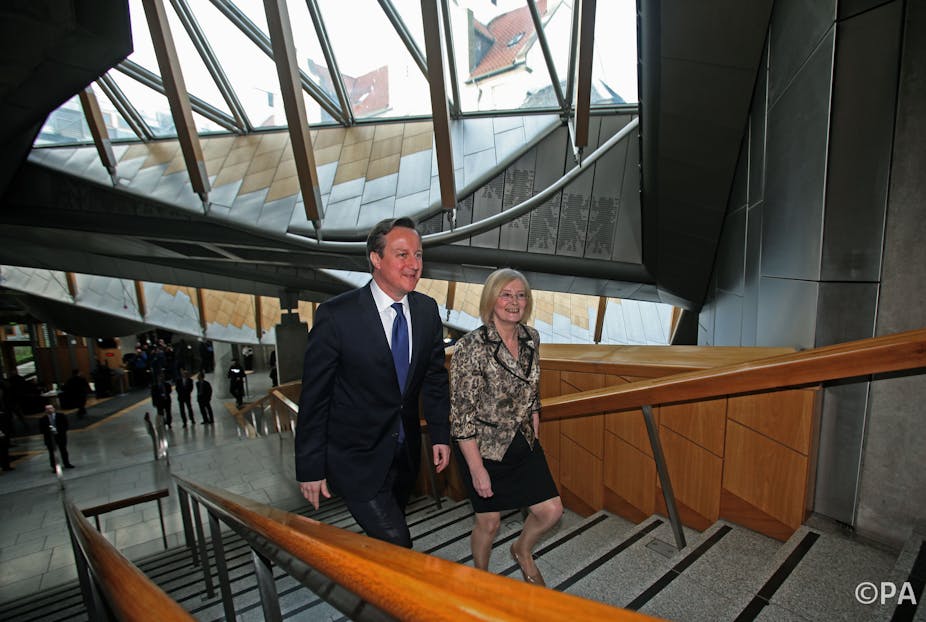And so it has arrived: draft legislation on further powers for the Scottish parliament, published before Burns Night (January 25), in accordance with the timetable set out in the wake of “The Vow”.
As David Cameron, the prime minister, said in Edinburgh at the announcement:
We said we’d get cross-party agreement by St Andrew’s Day – and we did. We said draft legislation would be published by Burns Night – and here we are, three days before the celebrations start, with those clauses before us.
The welfare row
There appear to be two clear fault lines emerging since the announcement. The first, which has the most resonance in Scotland, is over the issue of whether powers devolved over welfare are to be fully within the remit of the Scottish government or whether the UK government will retain some influence in this sphere.
First Minister Nicola Sturgeon has been arguing that the draft clauses do not provide “a general power to create new benefits in devolved areas as was promised by the Smith Commission and gives the UK government effective veto over changes to universal credit, including bedroom tax.” The Scottish National Party (SNP) appear to be making this the theme of their response, with Pete Wishart MP calling the legislation a “veto-ridden document”.

Secretary of State for Scotland Alastair Carmichael, in response to this question from journalists, simply said that the first minister was “wrong”, and that there was nothing in the draft legislation which would prevent the Scottish government from pursuing its own priorities with regards to welfare benefits.
The relevant section of the draft legislation is this:

This says the secretary of state must be consulted about Scottish government intentions with regard to changes to welfare benefits, and that they must subsequently provide their “agreement” that the Scottish government can proceed to make such changes. David Mundell, under-secretary of state for Scotland, argued it meant that the UK government “will need to understand what the Scottish government intends to do with the new powers.”
What Wales tell us
In several respects, this clause is reminiscent of the Government of Wales Act 2006 and the process through which further powers could be delivered to the national assembly for Wales through a complex system of legislative competence orders (LCOs). In this system, an LCO committee was formed with members of the House of Commons and House of Lords to consider whether the power should be devolved, before being presented to the secretary of state for Wales for agreement or veto (and subsequently voted upon, both in the Commons and the Lords).
Amid delays that were based, in part, on political point-scoring, the system lasted only five years before the Welsh Assembly Government moved forward with a referendum to get rid of the LCO system and devolve further powers in one go – evidence, perhaps, that a system which requires the agreement of both devolved and central governments on policy changes might prove detrimental to effective governance.
The EVEL that men want
The second fault line is, rather predictably, the wider constitutional ramifications of further devolution to Scotland. During David Mundell’s statement in the House of Commons, Conservative MPs lined up to point out that now Scotland had been dealt with, England should be next.

The matter of English votes for English laws was raised by several speakers keen to make sure the issue of how England is governed remains on the UK political agenda – further to Chancellor George Osborne’s comments earlier in the week that Scottish MPs shouldn’t be allowed to vote on aspects of income tax that don’t pertain to Scotland. No doubt they were given added impetus by Nicola Sturgeon’s announcement of a change in SNP policy, which would see their MPs vote on English health matters that affected the NHS in Scotland.
Bear in mind too, that at this stage, this is just draft legislation. While each of the three “large” UK parties (quite how large they will be after May’s election remains to be seen) have committed to delivering upon the legislation within a reasonable timeframe, the final details of legislation will still require substantial consideration. And with the likelihood of substantially greater numbers of SNP MPs taking seats in the House of Commons after May, this is unlikely to be the end of the story.

